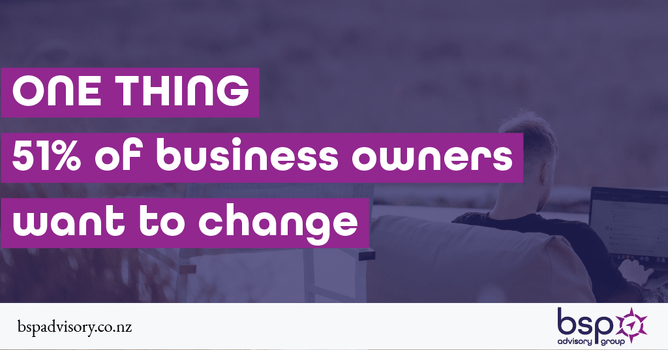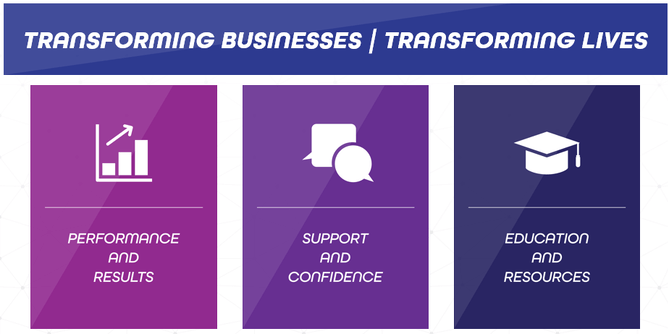We interviewed 1,500 business owners and asked: “If you could change one thing in your business, what would it be?”
Running a business in New Zealand is not for the faint-hearted.
Covid, labour shortages, recruitment difficulties, supply chain pressures, rising costs — all piled onto an already demanding role for owner-operators. So, we recently checked in with over 1,500 business owners to understand what they’re struggling with right now.
The answer surprised us.
51% said the number one thing they wish they could change is their work/life balance.
Not profit.
Not sales.
Not staff.
... their work/life balance.
And the deeper we looked, the more we realised this is not just a New Zealand issue. Advisors and coaches around the world are reporting the same trend — and it’s growing.
Why is it so hard to achieve work/life balance in business?
Our BSP advisors hear the same phrases every week:
“I’m doing huge hours and weekends. I’m exhausted.”
“If I leave the business, things fall apart.”
“I want time off, but it always costs me profit.”
“I’ve tried to plan better, but nothing sticks.”
“My phone never stops — I’m always dragged back into the office.”
“I’m constantly behind on admin and emails.”
Owner-operators are being pulled in all directions:
clients, staff, family, financial pressures, and a to-do list that seems to grow faster than they can clear it.
From a STEP programme perspective, this is a classic STEP Up and then STEP Back — the business is still heavily dependent on the owner, there’s no leadership depth, and systems aren’t supporting them.
But psychologically, there’s another factor at play.
Is there a name for this common problem?
This overwhelm is well-documented worldwide and is often referred to as ADT — Attention Deficit Trait, a state where the brain simply can’t process any more information.
According to psychiatrist Dr. Edward Hallowell:
“Executives with ADT do whatever they can to handle a load they simply cannot manage as well as they’d like.”
This applies perfectly to NZ owner-operators:
driven, hardworking people shouldering everything themselves — often seeing it as a weakness to ask for help.
What causes owner overwhelm?
It’s rarely one thing.
It’s the accumulation:
A constant wave of tasks
Cashflow pressure
Staffing problems
Rising costs
Family responsibilities
Endless customer and staff demands
A never-ending inbox
This overload leads to common symptoms:
Distractibility
Impatience
Disorganisation
Procrastination
Pretending things are fine
Low-level panic
Missed deadlines
Survival mode
Constant guilt
Left unaddressed, this cycle becomes the owner’s “normal”.
The business can't run without them — and they can’t step back long enough to break the cycle.
This is exactly why the STEP Programme exists.
How the BSP STEP Programme Helps Break Overwhelm
Edward Hallowell’s research shows the first step out of overwhelm is talking to someone who understands the pressure.
In STEP language:
STEP Up helps owners get structure, systems, and visibility so daily chaos reduces.
STEP Back builds leadership and accountability so the business stops relying on the owner.
STEP Out becomes possible when the owner regains time, clarity, confidence, and control.
At BSP, we’ve seen productivity, energy, and morale shift dramatically once owners simply have someone to speak with who can guide them through the noise.
Many meetings start with listening — and end with clarity, direction, and relief.
This is part of BSP’s Support & Confidence pillar:
owners need both the tools and the emotional support to move from overwhelm to control.
Hallowell has seen significant productivity improvements simply by educating business owners and their managers to speak out if they are spiraling out of control.
So getting a business advisor you can relate to and share the business problems with together is a great starting point.
More simple solutions that may help (Alongside STEP Work)
Eat nutrient rich meals
Healthy food that feeds the brain is a good way to be clearer each day and look for solutions to avoid overwhelm.
Here are some examples Salmon, Eggs, Kale, Sardines, Liver, Blueberries, Meat, Fish, accompanied by healthy salads, potatoes and red rice.Take some time out
Do something relaxing such as walking on the beach, or spending time in a quiet area such as a city park. Sometimes just giving the brain time out will give you both time to think with more clarity. Don’t take the phone with you.Have an early night three times a week
Rest is important to the brain and yourself, so an early night every now and then can be very valuable. Try to get 8 hours every night regardless and have a few nights where you achieve 10 hours.Resist drinking excessive alcohol
Adding large quantities of alcohol to the mix just makes things worse and will impair your brain even further. It will also add to the fatigue so stick to water with the odd glass every now and then.
Business Is a Vehicle for Life — Not the Other Way Around
At BSP Advisory Group, our philosophy is simple:
Business is a Vehicle for Life.
If a business is consuming every hour and draining every ounce of energy, it’s no longer serving the owner — the owner is serving the business.
The STEP Programme exists to reverse that.
Structure (STEP Up)
Leadership depth (STEP Back)
Freedom and choice (STEP Out)
Overwhelm fades when the owner stops carrying everything alone and the business starts running the way it should.
If you’re feeling overwhelmed — you’re not alone, and you’re not failing.
Thousands of NZ owners feel the same.
The difference comes from taking the first step and talking to someone who understands the pressure.
If you think the overwhelm factor is creeping into your life, reach out.
We’re here to listen — and help you map the STEP path that gets you back in control.




